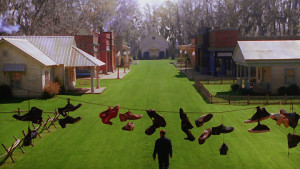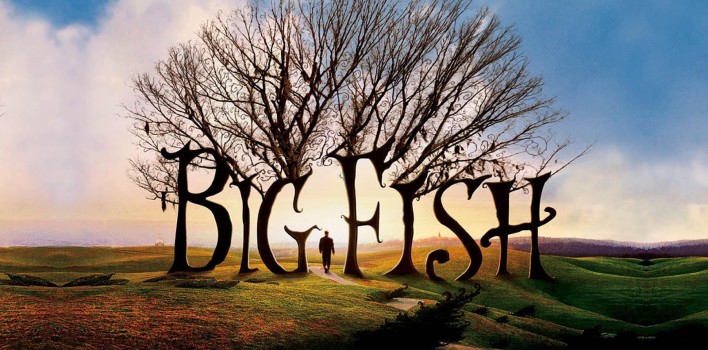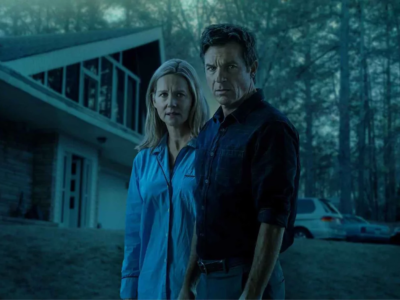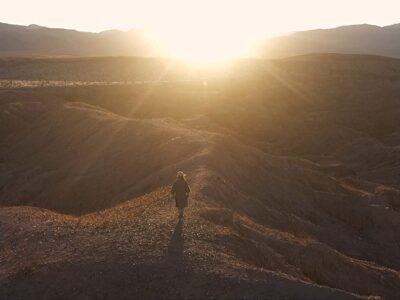Netflix Your Weekend – Big Fish
The legacy that a father passes down to his son can be a joy, as well as both a heartache and/or a headache. We often remember with fondness the small quirks our fathers had, like my dad whistling all the time, and then find ourselves doing the same things to our own or our spouse’s annoyance. A father can and will pass down virtues as well as flaws, their faith, values, and what shapes their reality and worldview. There has been and always will be great value in following in the footsteps of our fathers and the passing on of legacies and heritage.
Big Fish, directed by Tim Burton and starring Ewan McGregor, Albert Finney, Billy Crudup, and Jessica Lange, follows one of the most important and enduring legacies of a father and all human cultures; stories. The meta-story is when Edward Bloom (Ewan McGregor as young Ed and Albert Finney as senior Ed) is stricken with cancer and is dying. His estranged son, Will (Billy Crudup), comes to visit him from Paris with his wife (Marion Cotillard) after his mother (Jessica Lange) informs him the end is coming soon. Will is slightly reluctant, as he has always been suspicious that his dad’s somewhat mythic and fabled life, always told in elaborate and fanciful”big fish” tales, is far from fact and he really does not know his father really is. When he returns to be with his mother and father, he begins to talk to his father again in hopes of being able to separate fact from fiction. What Will gets is the full life treatment as his father recounts his mythical life of sports glory, small town heroism, mysterious towns, hungry giants, siamese twins, witches, mermaids, and the uncatchable fish. It’s when fact and fantasy blur and Will begins to discover that his father’s stories might not be that far from the truth.
Story, something we love here at Reel World Theology, is both the meta reality and the narrative force of Big Fish. Interwoven with the slow reveal of Ed Bloom’s history are the wild and fantastical stories told in a witty and artistic style that is absolutely becoming of the direction and stylings of Tim Burton. Like any great story, it is vivid, engrossing, and full of mythical elements that add layer upon layer of intrigue and fascination. It’s as if Burton had finally figured out how to capture the more whimsical aspects of The Nightmare Before Christmas into a live-action movie.
What has become so beloved about this movie is that it has the feel of a story that might have been told to you as a child, like The Princess Bride, and has that feel of fresh discovery when you fall in love with your childhood stories all over again as an adult. It’s like picking up The Hobbit 15 years later and crying, laughing, and gripping the pages and re-capturing childhood wonder and awe as you relive your first reactions and have subtle, new reactions to the story. Burton is capturing that as Will relives theses stories, despite being a factual curmudgeon, and discovers the reality of even the most fictitious elements of his dad’s stories. What makes a story true? Do we have to capture every event perfectly? How do we relay the emotions and events of our life in a meaningful and impactful way?
There is a scene towards the end of Big Fish(don’t worry I won’t spoil anything) where Will and the family doctor, Dr. Bennett, are speaking about Ed Bloom and his stories. Dr. Bennett asks him if he has heard the story of Will’s birth. When Will responds with the opening story of the movie, Dr. Bennett tells him the real, very uninteresting story of Will’s birth. Dr. Bennett then says:
“Not very exciting, is it? And I suppose if I had to choose between the true version and an elaborate one involving a fish and a wedding ring, I might choose the fancy version. But that’s just me.
Why do we prefer stories over facts? It might be as simple as facts are boring. However, I think the movie leaves us with the answer that our human race has been answering with story for thousands of years. The legacy we leave behind is often the stories and adventures we have shared and share with others. As Will Bloom puts it, “A man tells his stories so many times that he becomes the stories. They live on after him, and in that way he becomes immortal.”







